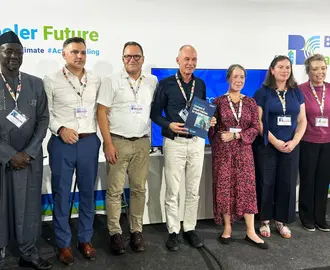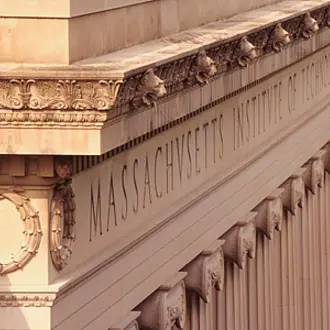Pitching Policy Ideas: How One Climate Policy Center Faculty Member Circulates Ideas to Policymakers
Pitching policy ideas is what Catherine Wolfram does. Her proactive approach to sharing her academic research scored her a prime time place in one California congresswoman’s efforts to reduce methane emissions.
Wolfram, the William Barton Rogers Professor of Energy Economics and a Professor of Applied Economics at the MIT Sloan School of Management, is also part of the inaugural class of affiliated faculty members for the Climate Policy Center. The Center is MIT’s front-door to policymakers seeking collaboration and input on their climate initiatives.
A chance meeting at a policy conference recently in Washington led to a dialogue between Wolfram and a top energy staffer in Congresswoman Julia Brownley’s office. Brownley was looking for a proactive approach to reducing methane emissions, and Catherine’s presentation sparked an idea.
In July, Congresswoman Brownley introduced the Methane Border Adjustment Mechanism Act, which would establish a tax on the methane emissions of imported oil and natural gas. The bill would expand on the domestic methane fee enacted by the Inflation Reduction Act by extending the same fee to any country wishing to export oil or gas to the United States, leveling the international playing field for U.S. producers.
Wolfram was featured as the lead validator in Brownley’s announcement with other important stakeholders like the Sierra Club, the Rocky Mountain Institute and the Environmental Defense Fund.
Working at the intersection of policy and academia comes naturally for Wolfram. From March 2021 to October 2022, she served as the Deputy Assistant Secretary for Climate and Energy Economics at the U.S. Treasury.
Here is our question and answer session with Wolfram about her current work and what she hopes to accomplish in the future working with the Climate Policy Center:
Q: Congresswoman Julia Brownley recently introduced her Methane Border Adjustment Mechanism (MBAM) Act, and you have been credited as one of the main sources of inspiration for the policy design. How did this whole process get started?
A: I met her energy and environment staffer, Scott Weathers, at a conference. We had a follow-up meeting and he said his boss was looking closely at methane emissions solutions. I said, “I’ve got the perfect idea for you!” I had already written a policy brief outlining how a methane border adjustment mechanism could be implemented and what its effects might be, so I forwarded that to him and it went from there.
Q: Once the staff of Rep. Brownley contacted you about your proposal, you could have simply sent them your published literature on this topic and left it up to them to develop the bill. Why did you decide to do more than that?
A: I was in the habit of pitching people on a policy proposal given my work on the price cap on Russian oil while I was at (the U.S. Department of) Treasury. Especially for relatively technical, new policy proposals, it can be useful for the academic (or whomever is intimately involved with its development and knows the arguments well) to hear the reactions to it directly to hone the message, and for the academic to be the one thinking about how to reply to new issues that came up. The Climate Policy Center wasn’t established yet, but the more general MIT Policy Lab really helped me navigate the whole process, especially understanding the ins and outs of different processes, what different actors’ incentives were, and what I could do to have more impact.
Q: How much time did you invest into supporting the Brownley office in getting this legislation ready for introduction?
A: Scott and I literally emailed almost daily. I talked to a number of organizations, some of whom ended up endorsing the bill, so that was definitely worth it. I’m proud to have the bill introduced and hope that it becomes an important part of the conversation, so it has definitely been worth it.
Q: Share with us some things you experienced in this process that were surprising to you, or things that you would do differently in the future.
A: Things are very fluid in the policy space, especially compared to academia where things change on a much longer time scale. Policy staff have dynamic career ladders, and you never know how long a certain staffer may be in their current role. If we hadn't focused so intently on getting the MBAM Act ready for introduction, our window of opportunity may have closed.
Q: What advice would you give your academic colleagues who’ve never yet engaged the policy community on the subject of their research?
A: I’ve always been a big fan of talking to a lot of people about new ideas, both to get the ideas into circulation and also to get different perspectives, and this just shows that including policymakers in that can really open up the possibilities for impact.
In this engagement I learned a lot about methane emissions and how to control them in the oil and gas sector. I’ve also learned about politics. For example, we heard from several Congressional offices that what we were proposing made sense, but that since they didn’t vote for the methane fee in the Inflation Reduction Act, they didn’t want to support the MBAM Act.
Q: What are some other policy proposals that you hope to inspire, whether in Washington, DC, or elsewhere?
A: Carbon pricing! The U.S. is off to a great start pricing the methane emissions from the oil and gas sector and there are huge climate benefits projected to come from that. I firmly believe that the U.S. will find its way to a carbon price sometime – it just makes too much sense to make people pay for emissions into the atmosphere, especially now that the government is in the business of paying to remove greenhouse gases. I hope we do it sooner rather than later as this could have big positive spillovers to the global fight against climate change.
Related Posts




